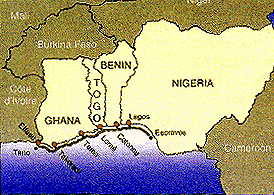
CONCERN OVER WEST AFRICAN GAS PIPELINE
|
|

Africa News
December 28, 2000
SECTION: NEWS, DOCUMENTS & COMMENTARY
LENGTH: 969 words
HEADLINE: West Africa;
WEST AFRICA: Focus On Concerns Over Regional Gas Pipeline
BYLINE: UN Integrated Regional Information Network (IRIN)
Conceived in the early 1990s by the US oil giant Chevron, the project is touted as key to reducing gas flares from Nigeria's oilfields reputed to be one of the major sources of greenhouse emissions worldwide, and is estimated to cost some US $400 million. The project is expected to boost, significantly, energy generation in West Africa, which will be consumed mostly by independent power producers in the recipient countries.
Apart from Chevron Nigeria Limited, which has a 36.7-percent stake in the joint venture now known as the West African Pipeline Company, there are five other participants. They include Nigeria National Petroleum Corporation with a 25 percent interest; Shell Nigeria which has an 18 percent stake; Ghana National Petroleum Corporation which owns 16.3 percent, and; Societe Benenois de Gaz SA and Societe Togolais de Gaz, each with a 2-percent stake.
Lauded as an example of regional economic cooperation, the promoters of the project in addition to the US $400-million it will cost to build the pipeline, expect investments of up to US $600 million in power plants, and US $800 million in other associated industrial investments, especially in minerals processing. It will also reduce the use of carbon-based fuels.
However, with the imminent take-off of the project, environmental groups are alleging that fears of the possible adverse environmental impact have been brushed aside in the interests of the consortium.
"Agreements have been negotiated and signed, contracts for the sale of gas have been sealed (and or about being sealed), yet the local people through whose communities the pipeline will traverse know nothing about the project," says 'Pipe Dreams', a recent report on the project jointly published by the Environmental Rights Action (ERA) of Nigeria and the international groups Oilwatch and Friends of the Earth.
"And against local and international laws, the consortium is yet to conduct an environmental impact assessment study for the project," it adds.
Likely negative impacts on the environment expected from the pipeline, which will take both onshore and offshore routes, include loss of flaura and fauna through clearing of vegetation, disruption of fishing activities, undermining of water quality by pollution and possible displacement of an estimated 50,000 people in communities living along the pipeline route.
There are also fears of fires from pipeline ruptures and changes to traditional land tenure systems.
Under the principles of the Rio Declaration agreed at the 1992 World Summit on the Environment in Brazil, impact assessments are required for all projects likely to have adverse effects on the ecosystem. This is reflected in the Nigerian Environmental Impact Assessment Law of 1992, the Ghanaian Environmental Protection Agency Act of 1994, the Lois Cadre Sur l'Environement en Republic du Benin enacted in 1999 and the Code de l'Environement en Republic du Togo of 1998.
Chevron, which is the project leader, insists that an impact assessment on the pipeline was never ruled out.
"The current routing activities include a desk-top review of land characteristics and usage, plus an on-the-ground survey for the purposes of preliminary design and early identification of potential community or environmental impacts," the company said in March, responding to enquiries by concerned environment groups.
"Every effort will be made to avoid community and environmental impacts, and where impacts are unavoidable, mitigation measures will be considered to minimise the impacts," it added, promising that full details would be made public as soon as the documents were ready.
So far, an impact assessment report is still not available. Environmentalist groups opposing the project have expressed fears that those communities likely to be affected by the pipeline project may be simply presented with a 'fait accompli'.
Pipe Dreams alleges that the pipeline consortium has not considered consulting with local people due to the wide legal protection oil and gas companies enjoy, especially in Nigeria from where the mineral will be pumped.
"Under the existing legal order, all minerals, oil and gas in Nigeria belong to the central government," Pipe Dream says.
Besides the Nigerian Land Use Decree of 1979 vests all land in the country in the government. The consequence of this for the oil and gas industry is that whenever the partnership of the government and oil companies require land for any purpose, industry can take the land without consulting local communities; and it would only be required by law to pay compensation for crops and buildings but not for the use of the land.
The report alleges that as a result of government involvement in the oil and gas industry, institutions created by law to monitor the compliance with environmental standards in the sector have remained hamstrung to enforce the rules.
"The wetlands and the mangroves that the pipeline will
traverse are universally registered as fragile ecosystems," the report
says. "For it to contribute to sustainable development in the subregion,
the diverse ecological zones through which the project will pass deserve
to be protected. This does not seem to be on the agenda of the West African
Gas Pipeline consortium."